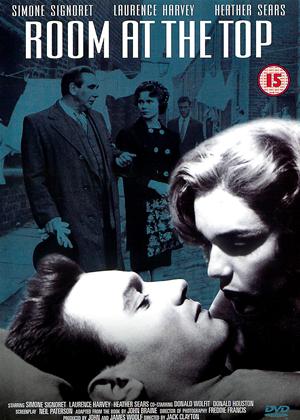
- General info
- Available formats
- Synopsis:
- In 1950's industrial Yorkshire, social climber Joe Lampton (Laurence Harvey) woos the boss's daughter as he sets out to reach the top of his profession. But when his working-class background hampers his efforts, Joe seeks solace with the unhappily married Alice (Simone Signoret), an affair that will have dire consequences.
- Actors:
- Laurence Harvey, Simone Signoret, Heather Sears, Donald Wolfit, Donald Houston, Hermione Baddeley, Allan Cuthbertson, Raymond Huntley, John Westbrook, Ambrosine Phillpotts, Richard Pasco, Beatrice Varley, Delena Kidd, Ian Hendry, April Olrich, Mary Peach, Anthony Newlands, Avril Elgar, Thelma Ruby, Paul Whitsun-Jones
- Directors:
- Jack Clayton
- Producers:
- James Woolf, John Woolf
- Writers:
- Neil Paterson, John Braine, Mordecai Richler
- Studio:
- DD Home Entertainment
- Genres:
- Classics, Drama, Romance
- Collections:
- 10 Films to Watch if You Like: A Hard Day's Night, Acting Up: British Actresses at the Oscars, Acting Up: Top 10 Performances At Cannes, Award Winners, BAFTA Nominations Competition 2023, BAFTA Nominations Competition 2024, BAFTA Nominations Competition 2025, Getting to Know..., inema Paradiso's 2023 Centenary Club: Part 2, Introducing a British Film Family, The Golden Age of British Pop Musicals, A Brief History of Film..., The Instant Expert's Guide, The Instant Expert's Guide to Basil Dearden, The Instant Expert's Guide to Stephen Frears, Top 10 Films By Year, Top 10 Films of 1959, Top 100 BFI Films, Top Films
- Awards:
1960 Oscar Best Adapted Screen Play
- BBFC:
- Release Date:
- 20/05/2019
- Run Time:
- 117 minutes
- Languages:
- English LPCM Mono
- Subtitles:
- English Hard of Hearing
- Formats:
- Pal
- Aspect Ratio:
- Widescreen 1.66:1
- Colour:
- B & W
- BLU-RAY Regions:
- B
- Bonus:
- The Visit: Jack Gold's quietly devastating drama portraying the everyday life of a working-class single woman
- The West Riding in Archive Film
- Feature commentary by Neil Sinyard
- Feature commentary by Dr Josephine Botting
- Image galleries
More like Room at the Top
Found in these customers lists
Reviews (4) of Room at the Top
Superb 'angry young man' film - Room at the Top review by RP
A superb 'angry young man' film from 1959. Set in a 1940s post-war Yorkshire town, Joe Lampton (played by Laurence Harvey) takes an accounting job working for the local Council. An orphan from a working class background, he wants to move upwards in the local society and sets his sights on Susan Brown, the daughter of a powerful local businessman. He joins the local amateur dramatic society and has an affair with Alice, an older woman played superbly by Simone Signoret. Although patronised by Susan's boyfriend and family, Joe succeeds by getting Susan pregnant and marrying into money. But his love lies with Alice – who dies in a car accident after drowning her sorrows on news of Joe's forthcoming marriage, leaving Joe with a deep sense of guilt which lasts past his wedding day.
The star of the film is without doubt Simone Signoret who won a 'Best Actress' Oscar for her performance. The film also picked up the BAFTA for Best Film and another Oscar for best screenplay.
Laurence Harvey is an actor who I can't usually stand. Having said that, he really is right for the role of Joe Lampton who is not only a social climber but a 'user' of others, a bit of a coward, and altogether a not very nice chap. Apart from the somewhat dodgy Yorkshire accent (despite his English sounding name, he was Lithuanian via South Africa) his role is well played.
There's plenty of period detail (much smoking, every man wearing a suit to work and in the pub, boys in short trousers, cobbled streets etc).
By today's film-making standards the film is perhaps a bit 'stagey' but it really is excellent. Highly recommended – 4/5 stars.
Room at the top - Room at the Top review by AF
Loved this film...a morality tale of "be careful what you wish for" but also a complex story about class, love and wanting to achieve.
The relationship of Joe Lampton and Alice were compelling and Simone Signoret's character was beautifully played. Alice's death helped Joe to realise that he did truly love her and that money isn't everything. I also felt more sympathetic Joe once he realised the loss of Alice as his relationship with Susan was so cold and calculating.
Northern Realism (spoilers. - Room at the Top review by Steve
This is Jack Clayton's masterpiece, a groundbreaking work of social realism which broke British cinema's prohibition on sex. The story begins just after the war, in a time of austerity. The son of a Yorkshire miner (Laurence Harvey) seeks wealth, not by raising his own class, but by getting a rich girl pregnant and marrying into money.
How revolutionary this film was in the late '50s is indicated by how difficult it was to cast. There was no one really suitable for these roles. The male lead was played badly by the inflexible Lithuanian born Laurence Harvey. Legendary French actor Simone Signoret was brought in to portray the damaged married woman who loses out to Heather Sears' virginal milltown debutante.
Signoret's consuming-Oscar winning- portrayal is a landmark. She a mature woman well into middle age for whom love and life has mainly brought disappointment; sexually, emotionally and socially. And yet, her sensuality, and her unreachable loneliness makes her painfully sympathetic.
It's hard to believe that any of the Rank school of leading ladies could have contributed something comparable. It's is one of the most powerful performances in any UK film. The supporting cast is exceptional with Hermione Baddeley particularly memorable. Clayton never got due recognition. This is the best film of the British new wave.


